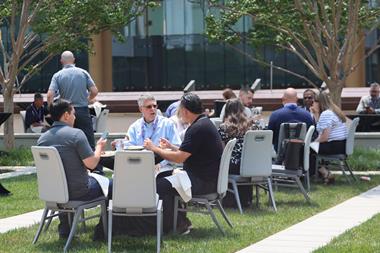 Back in 2010, China's Geely Cars bought Volvo Cars from Ford, leading to a huge period of change. Chinese billionaire Li Shufu, who now controls the OEM, wanted to globalise Volvo cars, move into China and learn what he could from the carmaker. Volvo didn't have a global footprint but it was selling globally with a European footprint. Today, it is very much an international presence.
Back in 2010, China's Geely Cars bought Volvo Cars from Ford, leading to a huge period of change. Chinese billionaire Li Shufu, who now controls the OEM, wanted to globalise Volvo cars, move into China and learn what he could from the carmaker. Volvo didn't have a global footprint but it was selling globally with a European footprint. Today, it is very much an international presence.
The company changed tack after being bought by Geely, moving from a volume approach, to a profitability approach. The focus was no longer on shifting as many cars as possible, but making the cars Volvo did shift profitable.
On the logistics side, Volvo improved its flow. "The base is a lean, main production line," said Erik Uyttendaele, director of plant logistics at Volvo Cars Gent, who was speaking last week at a meeting of the European cross-industry organisation ELUPEG in Belgium. From there, the OEM maximises just-in-sequence, just-in-time and warehouse-on-wheels deliveries. While in the past, Volvo used to outsource its pre-assemblies, it is now insourcing.
Pearl chain pull
To increase efficiency, Volvo Cars is now driving logistics changes globally, optimising the total value chain from supplier to customer, developing lean supplier manufacturing and optimised landed cost, and ensuring a perfect sequence all the way to the customer, using what it calls some "pearl chain" pull thinking.
The OEM now freezes the building sequence ten days ahead, due to producer complexity. While this ensures a low failure rate, there are no holes in the supply chain to accommodate small orders. The supply chain follows a strict fixed plan sequence, synchronising material and production flows. Uyttendaele said that final assembly is the most important value stream, and the big challenge is multi-model production.
"Volvo used to have a bag of pearls [each pearl is a vehicle] and shake it every day," said Uyttendaele. "But you need to have an order, a pearl chain, so ten days upfront we freeze the sequence, synchronise material flows with production flows and it all comes together in the end."
Through moving from a bag of pearls to a pearl chain, Volvo Cars has stabilised its supply chain and created stability for its suppliers.
"Everything is now managed, other than a fire in a tunnel or something," he added. The plant runs 24 hours a day and produces one car every minute, with a 99.2% success rate.
Supplying the parts
The OEM has also developed a balanced multimodal gateway. Many parts are sourced in Europe, consolidated by Volvo, then shipped to China, rather than the suppliers shipping all the parts themselves. Uyttendaele described this as "almost like a knockdown package." Currently, Volvo supplies 5m parts every day, to produce 1,200 cars a day. Along with ensuring control of its parts, Uyttendaele said that OEMs need to control their data.
He also said that while using local suppliers is a commendable idea, sometimes it is not feasible when you have to consider costs. Instead, it needs to be decided on cross-functional input, considering variations such as material, transport and handling costs, as well as inventory costs and cash effect. The business case is driven by purchasing but in cooperation with manufacturing and logistics.
Drawing the parallel
 At the ELUPEG meeting, held at the port of Ghent, Uyttendaele drew the parallels between Volvo Car's logistics and those of a port. Both seek to develop a local-to-global, total pipeline approach that is cost optimised and both have a dedicated, balanced and multimodal corridor. At Volvo Cars, strategic decisions are taken on a corporate level, processes are steered locally, and the supply chain must remain flexible and lean, while ports have to remain flexible regarding connecting continental flows with maritime flows. And, while resources within Volvo Cars are specifically developed to create centres of excellence, a port could be defined as a centre of excellence for a specific competence.
At the ELUPEG meeting, held at the port of Ghent, Uyttendaele drew the parallels between Volvo Car's logistics and those of a port. Both seek to develop a local-to-global, total pipeline approach that is cost optimised and both have a dedicated, balanced and multimodal corridor. At Volvo Cars, strategic decisions are taken on a corporate level, processes are steered locally, and the supply chain must remain flexible and lean, while ports have to remain flexible regarding connecting continental flows with maritime flows. And, while resources within Volvo Cars are specifically developed to create centres of excellence, a port could be defined as a centre of excellence for a specific competence.
Competence is the underlying value at Volvo Cars. Uyttendaele said, "At the start, you have a new car order with a delivery promise, and at the end the new car delivery to the end customer."
Volvo Cars needs to get to the point of use in a perfect sequence, moving through ordering, material supply chain, production, transportation and delivery, and "the winners will be those who build cars for customers," Uyttendaele concluded.
ELUPEG is a European organisation focused on fostering logistics collaboration. The group recognises the importance of including all major stakeholders, hence members include manufacturers of all kinds, logistics and transport companies, retailers, distributors, technology providers, consultants, educators, and financial service providers. ELUPEG hold regular meetings to discuss projects, progress, and solutions. The next meeting is on Thursday April 16th in Valencia. For more information and to learn more about membership, click here.





































